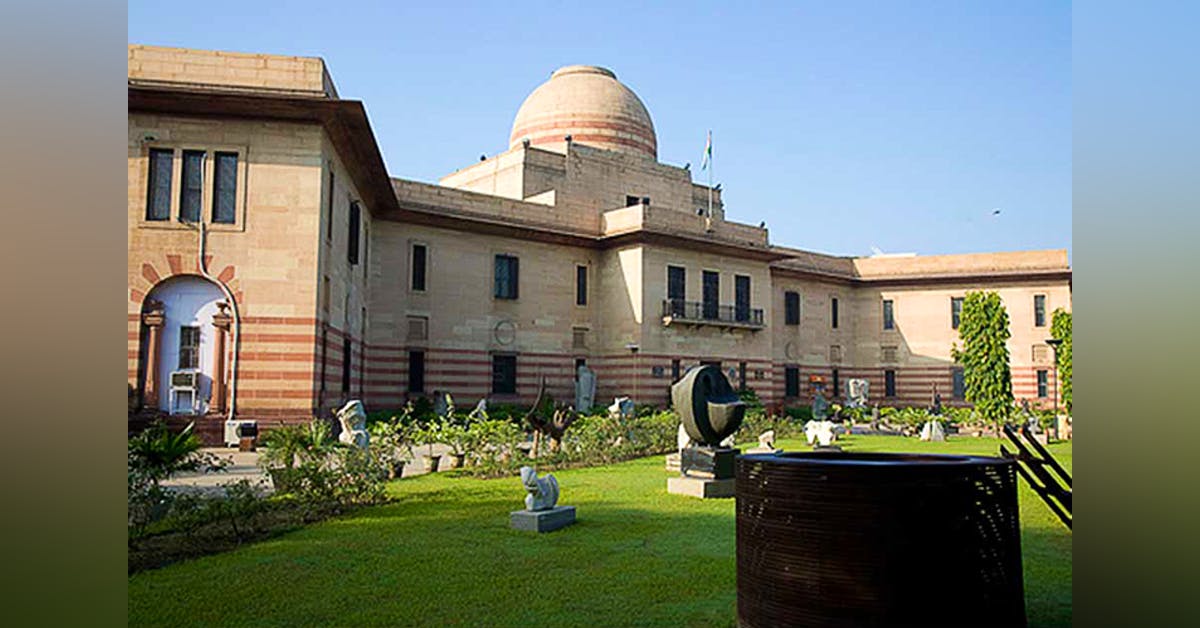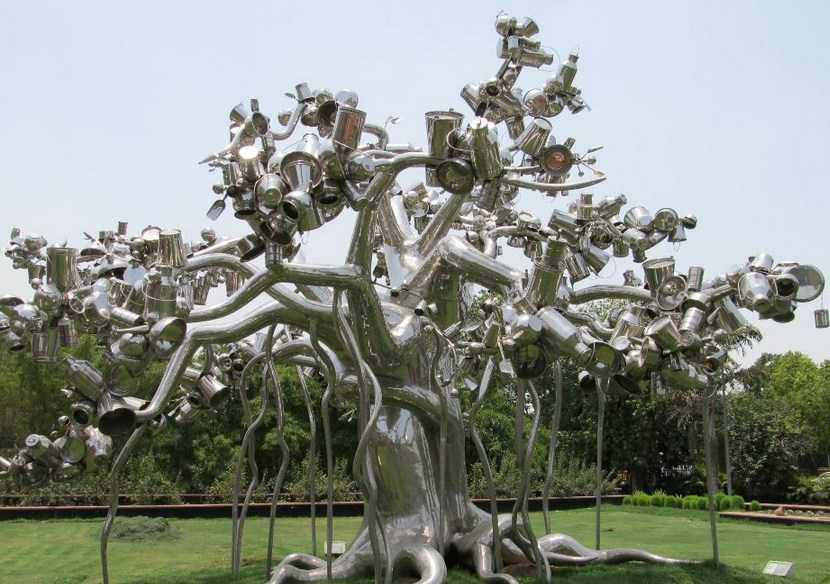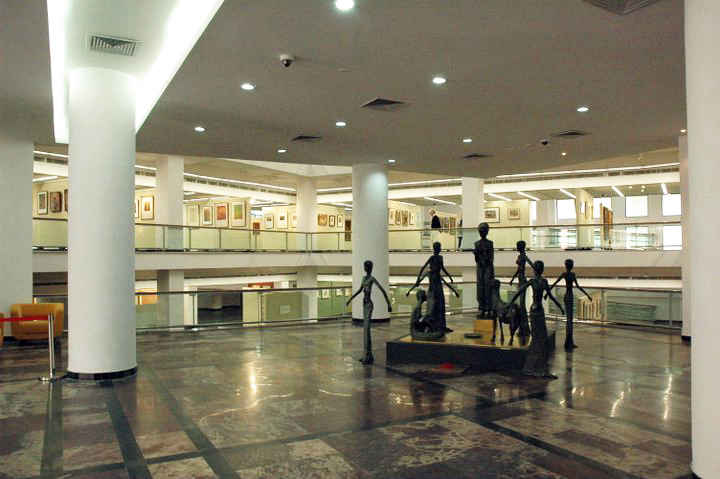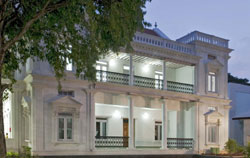The National Gallery of Modern Art (NGMA) is the premier art gallery under Ministry of Culture, Government of India. The main museum at Jaipur House in New Delhi was established on 29 March 1954 by the Government of India, with subsequent branches at Mumbai and Bangalore.

Its collection of more than 1700 works by 2000 plus artists includes artists such as Thomas Daniell, Raja Ravi Verma, Abanindranath Tagore, Rabindranath Tagore, Gaganendranath Tagore, Nandalal Bose, Jamini Roy, Amrita Sher-Gil as well as foreign artists. Some of the oldest works preserved here date back to 1857. With 12,000 square meters of exhibition space, the Delhi branch is one of the world's largest modern art museums.
The comprehensive collection of NGMA and its regional centers comprise around 17,000 art objects - paintings, drawings, sculptures, prints, photographs, and installations, essentially by Indian artists, built over the years through gifts, purchases, and permanent loans.

It currently represents the works of about 2000 artists from India and abroad, and as in all dynamic institutions, the collection would continue to grow meaningfully.
The National Gallery of Modern Art began its systematic acquisition of modern arts by purchasing Amrita Sher- Gil’s paintings. Among the 161 paintings handed over to the National Gallery of Modern Art, Sher-Gil and Tagore’s paintings comprised more than half of the Museum’s collection. An exemplary part of the Museum’s collection constitute the 33 paintings purchased by the government from Egan alongwith the 33 paintings donated by Sher- Gil’s father Umrao Singh.

The year between 1950 and 1954 saw the acquisition of the same number of works by the artist Abanindranath Tagore. Furthermore, Abdur Rahman Chughtai was represented by ten paintings while Jamini Roy and Nandalal Bose by eight paintings each.
The strength of the NGMA collection is its impressive representation of the evolution of modern Indian art. The gallery has paintings by artists including Thomas Daniell, Raja Ravi Verma, Abanindranath Tagore, Rabindranath Tagore, Gaganendranath Tagore, Nandalal Bose, Jamini Roy, Amrita Sher-Gil and various other artists. The earliest are the indigenous schools of great Indian Miniatures; the vibrant Company, Kalighat and Tanjore schools of paintings.
Portrait of a Lady by Raja Ravi Varma
The NGMA has major collections of these artists oeuvre. 1940's onward saw the emergence of different artists groups in major cities. The Progressive Artists Group in Mumbai with MF Husain, FN Souza, KH Ara, SH Raza, the Calcutta group with Gopal Ghose, Paritosh Sen and Prodosh Das Gupta were significant in livening up the art scene of the period.
Woman Holding a Fruit by Raja Ravi Varma
Following the spirit of group activity, K. C. S. Panicker along with S. G. Vasudev and K. Ramanujan set up the idyllic artists commune in Cholamandal, near Chennai.

The Taj Mahal by William Hodges
The art of1950’s and the 1960's saw the rise of Indian abstract art and a pendulum swing between international modernism and traditional roots.
Aurangzeb's Mosque by Thomas Daniell
There is also a representative collection of artists who explored expressionism, surrealism, fantasies as well as pop art, during the 60’s and the 70'S.

Young Girls by Amrita Sher-Gil
The NGMA has a collection of modern sculptures by famous sculptors like D. P. Roy Choudhury, Chintamoni Kar and Ramkinkar Baij. The NGMA holds a rich and varied collection of works of the major sculptors of the country.

Steel tree - with utensils
Painters, who have made significant contributions in sculpture, have been collected by NGMA. They are Prof. K.G. Subramanyan, Satish Gujral, amongst others. Printmaking has been a strong current in modern Indian art. The innovative experiments from 19th century onwards have been recorded with an exemplary collection of graphic prints of artists such as Jyoti Bhatt, Somnath Hore, Krishna Reddy, Anupam Sud, and Laxma Goud.

Modern art with utensils
The NGMA has a large collection of photographs by Lala Deen Dayal, one of the pioneers of photography in India. The NGMA began collecting photographs as an art form during the late 70 's. The collection is small, yet distinguished.
Raja Deen Dayal's photographs of the regal life of early - 20th - century Hyderabad area treasure. so are the photographs of contemporary India by Raghu Rai, and modern cinema by Nemai Ghosh and Dayanita Singh. The collection also includes sculptures, graphics and paintings by international modern artists such as Jacob Epstein, Giorgio de chiricio, Sonia Delaunay, A. Tapies, Robert Rauschenberg, Se Duk Lee, D. C. Daja, Peter lubarda, Kozo Mio, George Keyt and Fred Thieler.

Situated at the end of Rajpath, in the Central Hexagon around the India Gate, the building was a former residential palace of the Maharaja of Jaipur, hence known as Jaipur House. The butterfly-shaped building with a central dome and built in 1936, and designed by Sir Arthur Blomfield, after the construction of Lutyens' Delhi. The Central Hexagon around the India Gate, where the buildings of leading princely states were situated, was itself designed by Sir Edwin Lutyens.

Though the idea of the National Gallery was floated in 1949, it was formally inaugurated by Vice-president Dr S.Radhakrishnan in 1954, in the presence of Prime Minister Jawaharlal Nehru. Hermann Goetz (1898–1976), a noted German art historian became its first curator and in time it added new facilities such as Art restoration services, an Art reference Library and a Documentation Centre.
The gallery at Jaipur house opened with an exhibition of Indian sculptures, showcasing myriad of 65 Indian sculptures, displayed in five rooms of the Jaipur house, by 31 artists like Debi Prasad Roy Chowdhury, Ram Kinkar Baij, Sankho Chaudhuri, Dhanraj Bhagat and Sarbari Roy Chowdhury. This event was even curated by Hermann Goetz.

The startup aim of the museum was the acquisition and preservation of art works from 1850 to till date, mainly paintings, sculptures and graphics and later also photographs.